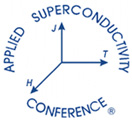Short Courses
Short Courses sponsored by:
CryoZone B.V., Oxford Superconducting Technology, Inc.
and SuperPower Inc.
All Short Courses will take place at the Omni Shoreham Hotel on Sunday, August 1.
**Pre-Conference
Registration Deadline: Monday, July 12.**
Space is limited and available on a first-come, first-served basis. Fees for short courses are non-refundable. A substitute registrant will be accepted. Fees for short courses are not included in the Conference Registration Fee(s).
Short course fees include lunch.
If you have any questions after learning about the short course options, please contact Ulf Trociewitz by email.
#2: Superconducting Materials Development – Current Status and Future Directions
and
#4: Testing of Superconducting Wires and Coils
Full Day Short Courses – 8:30 am – 4:30 pm
Cost: Non-Students: $200 (early), $250 (late); Students: $100
1. Modeling and Numerical Methods for Superconductors
Description: Before superconductors can be used in complex systems successfully, these systems need to be modeled to estimate their expected behavior and performance envelope. This course will cover simulation methods and modeling approaches. One part of the course will focus on magnet system optimization and magnet quenching. High-field magnet systems are characterized by large stored magnetic energy and high mechanical stresses. System optimization takes into account structural analysis of conductor and support structures, magnetic properties of the superconductors, and active and/or passive protection systems to minimize total system cost and performance risk. Modeling approaches for such optimization and guidelines for the efficient design of high-field magnet systems will be provided. Methods for the analysis/simulation of a quench, and related physical processes (particularly normal zone propagation) in superconducting magnets are reviewed. All major types of superconducting magnets are considered. The goal is to help magnet analysts and designers to select an adequate model for a quench in a given magnet. The other part of the course will describe the families of numerical techniques and the challenges related to this type of modeling. Particular attention will be given to the electromagnetic (for AC-loss computation) and to the thermal modeling (for thermal stability computation). This part is intended for people with a limited knowledge of numerical modeling, but who are interested in getting a quick start in this field.
- Optimization of High-Field Superconducting Magnet Systems
Soren Prestemon, Lawrence Berkeley National Laboratory - Quench Protection and Propagation Analysis of Adiabatic, Pool-Cooled and Forced-Flow-Cooled Superconducting (LTS) Magnet Systems
Andrew V. Gavrilin, National High Magnetic Field Laboratory - Families of numerical techniques and challenges in modeling HTS materials
Frederic Sirois, École Polytechnique Montréal, Canada - Electromagnetic modeling and AC-loss computation
Francesco Grilli, Karlsruhe Institute of Technology, Karlsruhe, Germany - Thermal Modeling:
Frederic Sirois, École Polytechnique do Montreal, Canada
CANCELED - 2. Superconducting Materials Development – Current Status and Future Directions
Description: Though almost one hundred years young, the field of superconductivity is still developing in exciting ways coming up with new materials and properties that enable a wide range of technological applications that are not possible otherwise. This course will cover the processing and properties of low and high temperature superconductors including the most recent superconducting pnictides.
- LTS Materials and Strands
Michael D. Sumption, Ohio State University - Second Generation HTS Wires
Paranthaman, Mariappan Parans, Oak Ridge National Laboratory - MgB2 Superconductors
Hiroaki Kumakura, National Institute for Materials Science, Japan - Processing and Properties of Bi2212 and Pnictides
Eric Hellstrom, National High Magnetic Field Laboratory
3. Superconducting Power Devices
Description: Many power applications are being developed that use superconducting materials. Designs have been proposed to take advantage of their unique properties and to achieve higher performance standards than conventional power devices. This short course section will cover Superconducting Fault Current Limiters, Superconducting Transformers, Superconducting Rotating Machinery, and Superconducting Cables. It will touch the basics of each application and describe the latest developments and ongoing projects. The course will also focus on future directions and research needs for advancing Superconducting Power Devices technology.
- High Temperature Superconducting Magnetic Energy Storage Systems (HTS-SMES)
Pascal Tixador, CNRS/CRTBT-LEG, Grenoble, France - Superconducting Fault Current Limiters
Matthias Noe, Institute for Technical Physics, Karlsruhe, Germany - Superconducting Devices for the Grid, Superconductors for Power Devices, Superconducting Motors and Generators
Philippe Masson, Advanced Magnet Lab, Inc. - Superconducting Cables, Superconducting Transformers
Mike Gouge, Oak Ridge National Laboratory
CANCELED - 4. Testing of Superconducting Wires and Coils
Description: Superconductors are the base of a wide range of important technological applications. To optimize use of the materials in these applications their properties need to be properly measured and understood. This course will cover the measurement of DC and AC electrical and mechanical properties of superconductors under various conditions and conductor configurations. It will also focus on dielectrics in cryogenic environment.
- Electromechanical Property Measurements of Superconductors
Danko van der Laan, National Institute of Standards and Technology - AC Loss Measurement of HTS Samples, Coils, and Cables
Robert Duckworth, Oak Ridge National Laboratory - Characterization in High Magnetic Fields
Arno Godeke, Lawrence Berkeley National Laboratory - Dielectrics - Its Range and Applications
Horatio Rodrigo, Center for Advanced Power Systems
Half Day Short Course – 8:30 am – 12:30 pm
Cost: Non-Students: $150 (early), 200 (late); Students: $70
Description: Superconductors also show significant presence in electronics. This half day course will cover the fundamentals of microwave superconductivity and qubits, the quantum mechanical analogue of the classical bit.
- Fundamentals of Microwave Superconductivity
Steven M. Anlage, University of Maryland - Superconducting Qubits
Frederick C. Wellstood, University of Maryland

